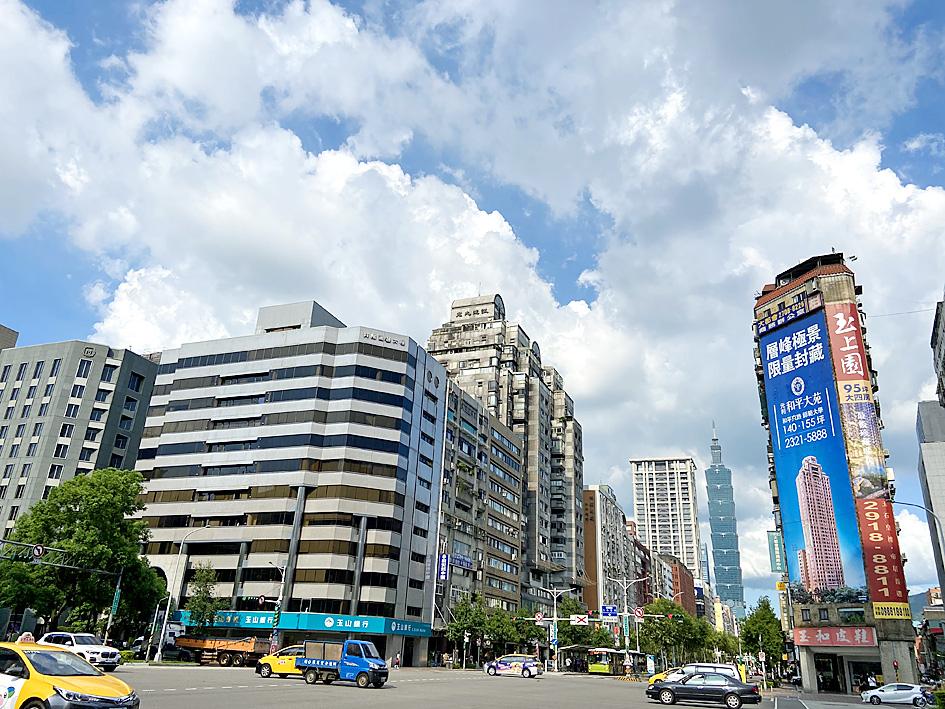New mortgages granted by five state-run banks last month reached the highest level since 2016, on the back of robust demand in the property market throughout the second half of last year, central bank data released on Friday showed.
New mortgages granted by Bank of Taiwan (臺灣銀行), Land Bank of Taiwan (土地銀行), Taiwan Cooperative Bank (合作金庫銀行), Hua Nan Commercial Bank (華南銀行) and First Commercial Bank (第一銀行) totaled NT$68.337 billion (US$2.41 billion), up 17.92 percent month-on-month and 13.13 percent year-on-year, the data showed.
This was the highest monthly issuance of mortgages since 2016, when the current integrated house and land sales tax was implemented, the data showed.

Photo: CNA
For the whole of last year, total new mortgages by the banks totaled NT$629.497 billion, up 6.23 percent from NT$592.553 billion in 2019, the highest in more than a decade.
The growing demand in the property market has driven up housing prices and triggered speculative transactions, especially in the presale property market, which last month prompted the government to introduce new measures to curb speculative transactions.
The new measures include stricter requirements on loans for real-estate buyers and developers, the disclosure of the actual-price registration system for property transactions, restrictions on option agreements for presale housing units, as well as stricter risk control over land and construction financing loans, and industrial land loans to prevent hoarding and speculation.
December is the traditional peak month for property transactions, the central bank said, adding that the measures to curb speculation would in a few months begin to affect the market.
The high number of new mortgages came on the back of a strong housing market in the six special municipalities, it said.
In Taipei, New Taipei City, Taoyuan, Taichung, Tainan and Kaohsiung, housing transactions totaled 26,225 last month, up 6.6 percent month-on-month and 17.5 percent year-on-year, concluding a strong showing in the past two quarters.
Housing transactions in the six cities totaled 250,175 last year, the highest in seven years and up 7.82 percent from 2019, Ministry of the Interior data compiled by the Taiwan Realty Enterprise Group (台灣房屋集團) showed.
Despite rising mortgage demand, the five banks’ average mortgage rate fell to 1.356 percent per year last month, down from 1.361 percent in November last year and 1.608 percent a year earlier, the central bank data showed.
Separately, the five banks’ average lending rates climbed to 1.291 percent last month, up 0.035 percentage points from 1.256 percent in November, the central bank said, attributing the uptick to higher costs for corporate loans.
Capital expenditure loans totaled NT$123.691 billion last month, the highest in 10 years, due to funding demand for corporate investment, and an increase in land and construction loans, the data showed.
The average capital expenditure lending rate was 1.739 percent last month, it showed.
Excluding government loans, the rate would be 1.316 percent, up 0.046 percentage points from 1.270 percent in November, the central bank said.

ELECTRONICS BOOST: A predicted surge in exports would likely be driven by ICT products, exports of which have soared 84.7 percent from a year earlier, DBS said DBS Bank Ltd (星展銀行) yesterday raised its GDP growth forecast for Taiwan this year to 4 percent from 3 percent, citing robust demand for artificial intelligence (AI)-related exports and accelerated shipment activity, which are expected to offset potential headwinds from US tariffs. “Our GDP growth forecast for 2025 is revised up to 4 percent from 3 percent to reflect front-loaded exports and strong AI demand,” Singapore-based DBS senior economist Ma Tieying (馬鐵英) said in an online briefing. Taiwan’s second-quarter performance beat expectations, with GDP growth likely surpassing 5 percent, driven by a 34.1 percent year-on-year increase in exports, Ma said, citing government

UNIFYING OPPOSITION: Numerous companies have registered complaints over the potential levies, bringing together rival automakers in voicing their reservations US President Donald Trump is readying plans for industry-specific tariffs to kick in alongside his country-by-country duties in two weeks, ramping up his push to reshape the US’ standing in the global trading system by penalizing purchases from abroad. Administration officials could release details of Trump’s planned 50 percent duty on copper in the days before they are set to take effect on Friday next week, a person familiar with the matter said. That is the same date Trump’s “reciprocal” levies on products from more than 100 nations are slated to begin. Trump on Tuesday said that he is likely to impose tariffs

HELPING HAND: Approving the sale of H20s could give China the edge it needs to capture market share and become the global standard, a US representative said The US President Donald Trump administration’s decision allowing Nvidia Corp to resume shipments of its H20 artificial intelligence (AI) chips to China risks bolstering Beijing’s military capabilities and expanding its capacity to compete with the US, the head of the US House Select Committee on Strategic Competition Between the United States and the Chinese Communist Party said. “The H20, which is a cost-effective and powerful AI inference chip, far surpasses China’s indigenous capability and would therefore provide a substantial increase to China’s AI development,” committee chairman John Moolenaar, a Michigan Republican, said on Friday in a letter to US Secretary of

Taiwan Semiconductor Manufacturing Co’s (TSMC, 台積電) market value closed above US$1 trillion for the first time in Taipei last week, with a raised sales forecast driven by robust artificial intelligence (AI) demand. TSMC saw its Taiwanese shares climb to a record high on Friday, a near 50 percent rise from an April low. That has made it the first Asian stock worth more than US$1 trillion, since PetroChina Co (中國石油天然氣) briefly reached the milestone in 2007. As investors turned calm after their aggressive buying on Friday, amid optimism over the chipmaker’s business outlook, TSMC lost 0.43 percent to close at NT$1,150